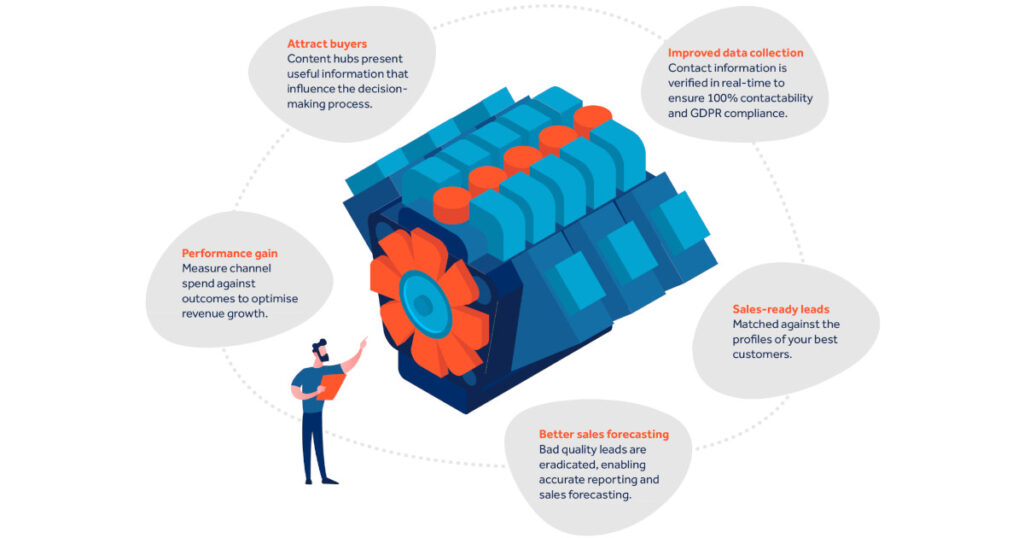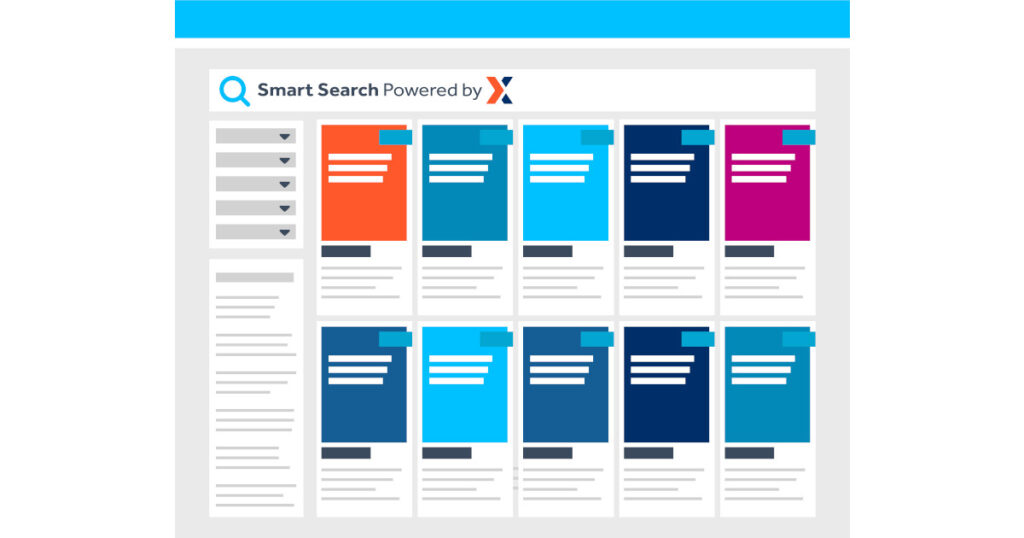B2B Marketing

The Customer Journey Reimagined: Guiding Buyers with Personalized Content Experiences
Delivering exceptional customer experiences is essential for attracting, engaging, and retaining customers.
Gone are the days of a one-size-fits-all approach to marketing.
Modern customers expect personalized, relevant, and timely content that addresses their unique needs and preferences. This is where content hubs come into play, transforming how businesses guide buyers through their journey with tailored content experiences.
Content hubs are centralized platforms that allow businesses to create, manage, and distribute high-quality content across multiple sites.
By leveraging the power of content hubs, companies can reimagine the customer journey, offering personalized content experiences that resonate with individual buyers at every stage.
Let’s explore how content hubs are reshaping the customer journey and helping businesses build stronger, more meaningful connections with their audience.
Understanding the Modern Customer Journey
Before diving into the role of content hubs, it’s important to understand today’s customer journey.
Buyers are more informed, empowered, and demanding than ever. They have access to vast amounts of information and expect brands to provide relevant, valuable content that addresses their specific needs and pain points.
The customer journey is no longer a straightforward path from awareness to purchase. Instead, it’s a complex, multi-channel process involving numerous touchpoints and interactions.
Customers may engage with a brand through social media, email, websites, mobile apps, and more, expecting a seamless, consistent experience across all these channels.
To effectively guide buyers through this complex journey, businesses need a deep understanding of their target audience. This involves gathering data on customer preferences, behavior, and interactions and using these insights to create targeted, personalized content experiences.

Personalization at Scale with Content Hubs
Content hubs give businesses the tools and capabilities needed to deliver personalized content experiences at scale.
By centralizing content creation, management, and distribution, content hubs enable companies to streamline their content operations and ensure consistency across websites.
One of the standout features of content hubs is their ability to segment and target specific audiences based on various criteria, such as demographics, interests, behavior, and stage in the customer journey.
By leveraging data and insights, businesses can create highly targeted content experiences that resonate with individual buyers and guide them towards a desired action.
For instance, a software company can use a content hub to deliver personalized content to prospects based on their job title, industry, and the challenges they face.
A healthcare industry prospect may receive content addressing unique regulatory and compliance challenges, while a retail industry prospect may get content focused on improving customer experience and boosting sales.
By delivering relevant, targeted content at the right time and through the right channels, businesses can build trust, establish thought leadership, and guide buyers through the complex customer journey.
Nurturing Leads and Building Relationships
Content hubs also play a crucial role in lead nurturing and relationship building. By providing a steady stream of valuable, relevant content to leads over time, businesses can keep their brand top-of-mind, build trust, and guide prospects towards a purchase decision.
With content hubs, businesses can create targeted lead nurturing campaigns that deliver personalized content experiences based on a lead’s interests, behavior, and stage in the buyer’s journey.
For example, a lead who has downloaded a whitepaper on a specific topic can be enrolled in a nurturing campaign that delivers additional content related to that topic, such as case studies, webinars, and product demos.
By providing leads with a consistent, valuable content experience over time, businesses can build stronger relationships, establish trust, and ultimately convert more leads into customers.

Measuring and Optimizing Content Performance
To effectively guide buyers through the customer journey, it’s essential to measure and optimize the performance of content experiences.
Content hubs provide businesses with robust analytics and reporting capabilities, enabling them to track key performance indicators (KPIs) and gain valuable insights into the effectiveness of their content strategies.
By monitoring metrics such as engagement, conversion rates, and revenue attribution, businesses can identify the content pieces and experiences that are resonating with buyers and driving the most impact.
This data can be used to optimize content strategies, refine targeting, and ensure that content experiences are continually improving over time.
By continually measuring, testing, and optimizing content performance, businesses can ensure that their content experiences are always aligned with the evolving needs and preferences of their buyers.
Seamless Integration and Scalability
Another key advantage of content hubs is their ability to integrate seamlessly with other marketing and sales technologies, such as customer relationship management (CRM) systems, marketing automation platforms, and analytics tools.
This integration enables businesses to gain a holistic view of the customer journey and ensures that content experiences are aligned with broader marketing and sales strategies.
Content hubs also provide the scalability needed to support the growing demands of modern content marketing.
As businesses expand their content operations and target new audiences, content hubs can easily accommodate this growth, enabling companies to create and distribute more content across more channels without sacrificing quality or consistency.

The Future of Content Experiences
As the customer journey continues to evolve and become more complex, the role of content hubs in delivering personalized content experiences will only become more critical.
Looking ahead, we can expect to see content hubs become even more sophisticated, with advanced artificial intelligence (AI) and machine learning capabilities that enable even greater personalization and automation.
We may also see the emergence of new content formats and experiences, such as interactive content, personalized videos, and augmented reality (AR) experiences, that further engage and immerse buyers in the brand story.
Ultimately, the future of content experiences will be defined by the ability of businesses to leverage technology, data, and creativity to deliver truly personalized, relevant, and valuable content to buyers at every stage of their journey.
The Future of Content Experiences
Delivering personalized content experiences is no longer a nice-to-have but a must-have.
Content hubs provide businesses with the tools and capabilities needed to reimagine the customer journey and guide buyers towards a purchase decision with targeted, relevant content.
By leveraging the power of content hubs, businesses can build stronger relationships with their audience, establish thought leadership, and ultimately drive more revenue and growth. As the customer journey continues to evolve, the role of content hubs in delivering exceptional content experiences will only become more critical.
If you’re looking to take your content marketing to the next level and deliver truly personalized experiences to your buyers, now is the time to invest in a content hub. By embracing this powerful technology, you can reimagine the customer journey and build lasting, meaningful connections with your audience.

About the Author
John Horsley, CEO of Demand Exchange, boasts over 20 years in B2B tech marketing. Partnering with leading technology businesses, he's pioneered growth-focused campaigns. Founder of Digital Doughnut and Digital Marketing, John's made waves on LinkedIn, equipping marketers with key insights. A sought-after speaker and thought leader, his innovative approach continues to influence the B2B marketing landscape.
About the Author

John Horsley, CEO of Demand Exchange, boasts over 20 years in B2B tech marketing. Partnering with leading technology businesses, he's pioneered growth-focused campaigns. Founder of Digital Doughnut and Digital Marketing, John's made waves on LinkedIn, equipping marketers with key insights. A sought-after speaker and thought leader, his innovative approach continues to influence the B2B marketing landscape.